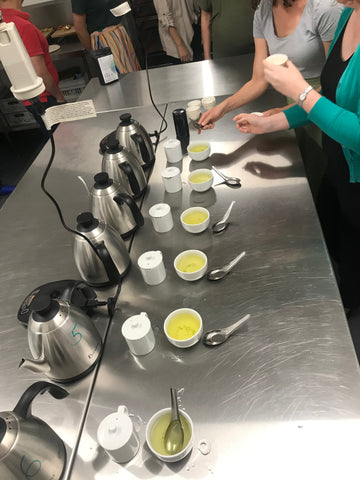Now moving on to the super tea geek 🤓 moments in our Water for Tea workshop. The tea tasting. Whilst our 2 hour workshop was not enough time to get too far into the experiments Dr. Monika Fekete (Coffee Sciences Lab) and I set up a blind tea tasting of 2 different teas using 6 different waters.
We selected a Japanese green tea (Kuritawase sencha) and a Chinese red or black tea (Golden Steed Eyebrow honey). We had chosen these 2 teas as our experience with tea and water experiments to date has shown that these 2 have the most dramatic and noticeable impact to colour, aroma and flavour when brewing using Brisbane tap water.
The water types we selected were:
- Brisbane tap water. The water source we are all familiar with in the workshop.
- Mg only from Coffee Sciences Lab Brew Water kit, 50ppm. Designed water showing how magnesium impacts aroma and flavour on its own.
- Melbourne tap water. An excellent comparison as it is often considered the best quality water available in the Australian states for tea making.
- Ca only from Coffee Sciences Lab Brew Water kit, 50ppm. Designed water showing how calcium impacts aroma and flavour on its own.
- Evian. Enjoyed by many as a water but an extreme example of a hard water.
- Pureau water. At 0 TDS water and available readily in Australian supermarkets this was used to demonstrate a water that was too empty of minerals and its impact on aroma and taste.
Our aim here was not to examine the best water for Brisbane tea. It was to demonstrate the impact of different waters on what we experience in the cup. And the attendees were asked to select their best cup and their worst cup.
First up was the Japanese green tea.

Whilst the results were mixed there was an overwhelming selection of best cups for water 5 - Evian. This was a huge shock as it is considered an extremely hard water. In Japan and what many in the Japanese tea loving community say is that they prefer to make tea using very soft water. The next preferred water was 4 - Ca 50ppm. This was not as surprising being such a soft water. The worst cup was 3 - Melbourne tap water! Who would have thought?
And now the black tea.

With the black tea there was not such an overwhelming support for one water over the other. The water selected by the largest number of attendees was 1 - Brisbane tap water followed by 2 - Mg 50ppm. The worst cup was 3 - Melbourne tap water🤷♀️. Incredible, right?!
Whilst we were very surprised by these results particularly considering this belief in Melbourne tap water being a better water for tea making Dr Monika Fekete explained that she has recently been in Brisbane undertaking a Water for Coffee workshop. She shared that they had a similar result in that workshop where the attendees gravitated to Brisbane water in a blind tasting of coffee too. What this does make us think, is that there is a level of acclimation and familiarity with the water flavour that you are familiar and have access to.
I will raise my hand and say that I didn't choose the best cups for either of the green or black tea. But my observations is that hard water, Evian and Brisbane tap, when used to make tea create liquors that are highly aromatic. But lack the flavour intensity and complexity when you drink them.
As mentioned in my last blog post we had a room that was split between coffee specialists and tea enthusiasts whether the level of familiarity with the 2 teas played a role. I believe people were so surprised by the high fragrance it impacted what they perceived they were tasting.
I can tell you that I am really excited to start doing more experiments and pulling more people into these. My ongoing interest lies in 2 areas.
- getting to a point where I can design water that mimics the water source of the tea producer. I strongly believe that the baking or roasting process is a really big variable in brewed taste. Unlike coffee where the roasting is done locally based on the water source that is available to the coffee roaster, the tea is finished at origin. I believe that the finishing of these teas is largely dependant on how that tea tastes for the producer at origin and I would love to be able to experience teas as an exact representation of the the producer.
- Not all tea styles and types taste the best with the same water. Finding and sharing recipes for water that highlight and accentuate different aspects of each tea is an area I would love to delve deeper.
I hope you have enjoyed this. For all of my water for tea blog posts please take a look at this collection. I would love to hear any comments or feedback you might have on this too.
As a big believer in letting people in on the fun and coming on this water journey with me I have partnered with Coffee Sciences Lab to be able to offer a small number of Water For Tea Brew Kits for you to play along. Take a look at these here.